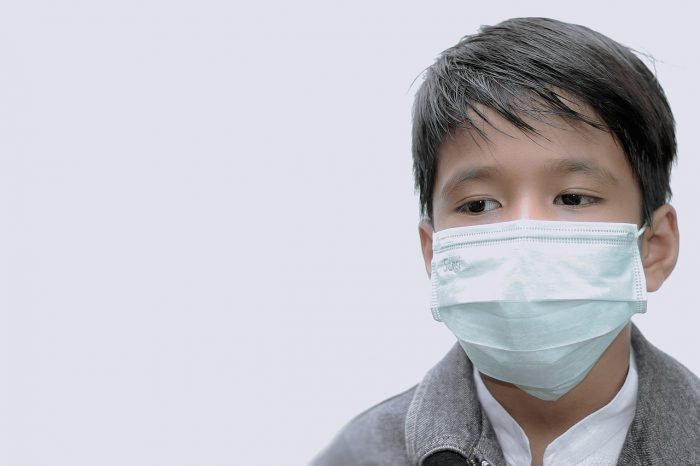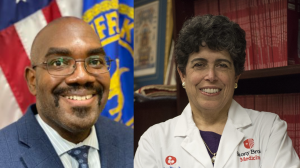COVID cases rise in weeks before start of academic year

People may think COVID-19 is out of sight and out of mind, but the virus, which is still around and is making people sick, doesn’t care.
The new variant of COVID, EG.5, or “Eris,” is making people sick in the area, with hospital admissions and visits creeping up over the last few weeks.

As of Aug. 9, 105 patients were hospitalized with COVID across the entire Northwell system, including 82 people on Long Island. That compares with 63 hospitalized patients on July 9, with 46 on Long Island exactly a month earlier.
That’s also the case for other area hospitals, doctors said.
“The numbers are definitely going up,” said Dr. Sharon Nachman, chief of the Division of Pediatric Infectious Diseases at Stony Brook Children’s Hospital. “That’s probably a snapshot of what we expect in the fall and the winter.”
Dr. Gregson Pigott, commissioner of the Suffolk County Department of Health Services, explained that COVID-19 is “no longer an emergency” but is “still with us and we continue to see new variants.”
In an email, Pigott explained that the county has seen a “slight uptick in hospitalizations” that is still low in comparison to the earlier days of the pandemic.
He urged those at high risk to take precautions that could include avoiding crowded places, wearing a mask and meeting people at outdoor venues rather than indoors.
While the numbers of people sick with COVID are substantially lower than they were during the worst of the pandemic in 2020, health care professionals suggested that the fall and winter could be challenging for families, particularly as children return to school.
“The first two weeks of school, every kid is sick,” said Nachman. “Come November-ish, that’s when we see” that increase.
Dr. Bruce Hirsch, attending physician in Infectious Disease at Northwell Health, also anticipates a rise in COVID-19 cases coming this fall and early winter.
“I think there’s a very good chance that a lot of people will be having COVID,” he said.
Hirsch added that the symptoms for those people who don’t have underlying medical conditions, such as cardiac or lung-related problems, are likely to be considerably milder than they had been in the early stages of the disease, when no one had resistance.
“The sickness will not have the severity and mortality except in those of us who are unfortunate to have weak immune systems, other health problems or who are elderly or frail,” Hirsch said.
Pigott added that Eris, which is a subvariant of omicron, is not a variant of interest or concern, according to the World Health Organization.
Vaccine options
Doctors urged people to consider getting vaccines for COVID, the flu and respiratory syncytial virus for this coming fall.
The Centers for Disease Control and Prevention and the U.S. Food and Drug Administration are expected to approve the latest booster for COVID in late September or early October.
The newest booster, which should be available from Pfizer, Novavax and Moderna, should include protection against the latest COVID strain.
“The new booster formulation is much more similar and much more protective [against] the current strains,” Hirsch said. “The booster available now is protective against a couple of strains ago.”
Pigott urged people to get the new vaccines in the fall when they become available and before the holidays.
The vaccination may not prevent infection or all symptoms, but doctors suggested it would make illnesses shorter and less severe and could make the virus less infectious.
That could be particularly helpful for those who might otherwise develop more significant symptoms as their bodies attempt to fight off the virus.
Health care professionals suggested residents could receive several vaccines at the same time, enabling their immune systems to build resistance to a host of potential health threats.
“Our immune systems can chew gum and walk at the same time,” said Hirsch. “They are miraculous at reacting to all kinds of things every day anyway. The immune system is more than up to the challenge of handling two [shots] at the same time.”
Receiving several shots at once could give people a sore arm and a short-term fever that will likely respond to Tylenol, Nachman said.
“The science has shown that if you give a bunch of vaccines, you get a great response to everything,” Nachman added.
People who would prefer to get the vaccines in separate doses should space them out over several weeks, rather than getting one after another on consecutive days, she said.
Warning to pregnant women
Apart from viral infections, doctors warned pregnant women and those who might get pregnant this winter about the ongoing shortage of a form of penicillin to treat syphilis.
Penicillin G benzathine, or Bicillin, is expected to be in short supply through the start of the summer of 2024.
The medicine is not only the only treatment recommended for pregnant people with syphilis, but is also the only one recommended for infants.
“We are prioritizing that medicine specifically only for that vulnerable population,” said Nachman.
The dangers of syphilis in pregnant women are significant, with the CDC estimating that about 40% of babies born to women with untreated syphilis can be stillborn or die from the infection.
Other dangers from syphilis include bone damage, anemia, enlarged liver and spleen, jaundice, nerve problems causing blindness or deafness, meningitis and skin rashes.
With cases of congenital syphilis more than tripling in recent years, the demand for Bicillin has exceeded the supply.
“It has been a concern for those in our Bureau of Sexually Transmitted Diseases,” Pigott explained. “They have been in consultation with the state. We defer to the state regarding supply.”
Locally, hospitals have been exploring other options without much success.
“We are looking for alternatives” to Bicillin, said Nachman, but “we are not necessarily finding them.”
Doctors urged pregnant women who think they might have syphilis to get tested to protect themselves and their unborn children.






